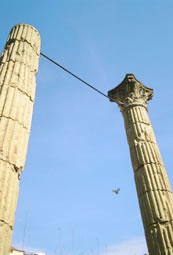
The Delta of Ebre
The Delta of Ebre covers 320 square kilometres and it is the second largest wetland area in the western Mediterranean, after the known French Camargue. It has many natural habitats not common to the rest of Catalonia: large lakes of salt water (such as La Tancada) or fresh water (such as L'Encanyissada), kilometres of beaches with sand dunes (El Fangar) and salt wastelands (Erms de la Tancada, Punta de la Banya), places where underground fresh water comes to the surface (Els Ullals), shallow bays (El Fangar or Els Alfacs), riverbank woods and fluvial islands that, together with the ecosystems created by man - rice fields and salt pans - constitute a unique landscape of great natural wealth.This diversity of flora and fauna ecosystems motivated the protection of a large part of the Delta in 1983, when it was stated as a "natural park". In fact it is an ornithological paradise where you can see more than 300 species of birds. Some of them are sedentary and others migratory, spending the summer or winter in the delta or perhaps just passing through. Species not found anywhere else in Catalonia include the white heron, the glossy ibis, the kingfisher, the squacco heron, and the flamingo, which join tens of thousands of ducks and other limicolous birds.
The Delta is also rich in plants, amphibians, fish and endemic invertebrates. The Natural Park provides good facilities for visitors and scientists, including an ecomuseum, several information centres, and a library. There is a biological station which was created for the researchers and a wildlife recuperation centre. In addition to the undeniable ecological value of this area, which is a paradise for ornithologists and nature-lovers, we cannot forget the beauty of its unspoilt beaches. The Delta is also an example of the man's struggle to tame a hard and difficult land through the crop of rice. The rice fields change its colour with the seasons and they become lost in the infinity among small houses and villages so it makes its harvest difficult.
Approfondimenti
- The Delta of Ebre
- The Ports of Tortosa-Beseit
- The Mountains of Prades
- The Montsant Mountain Range
|
FORUM
